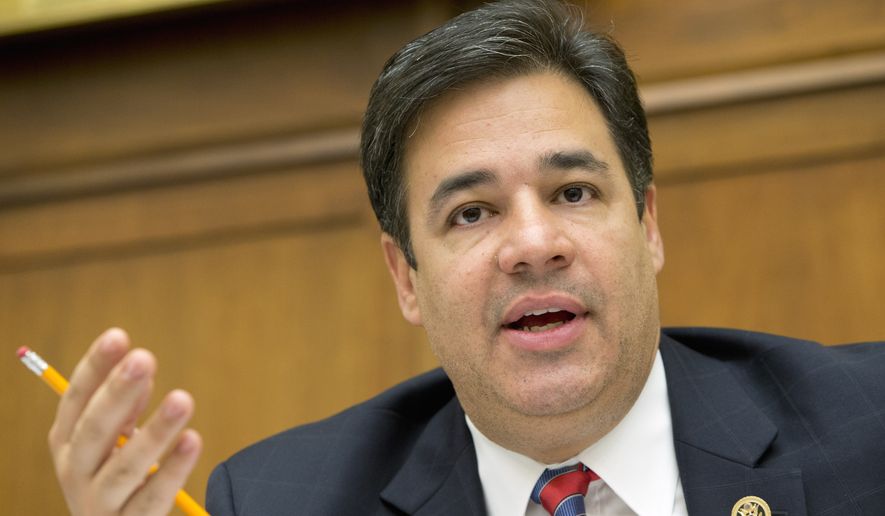Congress shouldn’t reauthorize the government’s most potent snooping powers until it imposes stronger safeguards for Americans, a key conservative lawmaker said in response to a judge’s ruling that U.S. intelligence agencies tried to hide potential breaches of privacy rights.
Rep. Raul R. Labrador, Idaho Republican, said Judge Rosemary M. Collyer’s April ruling is the latest in a string of warning signs that federal agencies need more oversight before Congress renews their broad powers under Section 702 of the Foreign Intelligence Surveillance Act.
In particular, Mr. Labrador and several colleagues want to know how often Americans’ information is scooped up and examined in a process that, according to Section 702, is supposed to be targeted at foreigners.
The National Security Agency and other intelligence branches have refused to divulge the information on Americans to Congress, even though Judge Collyer said in her ruling that the government could try to identify it.
“The importance of this issue has grown in light of recent allegations that the NSA may have abused its power to carry out a political agenda,” Mr. Labrador told The Washington Times. “Congress should not reauthorize Section 702 without real, meaningful safeguards for the Americans people.”
Section 702 allows the surveillance of foreign targets, who are noncitizens and located outside of the country, without the standard Fourth Amendment protections afforded to United States citizens.
The section is slated to sunset at the end of this year. Top security officials are pleading for Congress to renew the provision, which they say is one of the most important tools as the U.S. battles terrorism and tries to maintain its global leadership position.
The Senate Select Committee on Intelligence has scheduled a rare open hearing for Wednesday to give top intelligence officials a chance to make their case in public.
But potential abuses, including those documented by Judge Collyer, have created hurdles.
The judge said security officials had been breaking their own assurances for how they were using the information gleaned from foreign intelligence snooping — and only belatedly reported their breaches to the FISA Court, which was set up to be an independent check.
“On October 24, 2016, the government orally apprised the Court of significant non-compliance with the NSA’s minimization procedures involving queries of data acquired under Section 702 using U.S. person identifiers,” Judge Collyer wrote. “The full scope of noncompliant querying practices had not been previously disclosed to the Court.”
Elizabeth Goitein, co-director of the Brennan Center for Justice’s Liberty and National Security Program, said Judge Collyer’s opinion is just the latest to expose violations by the FBI, the CIA and the NSA.
“It is hard to find one of those opinions that doesn’t contain 20 to 30 pages describing all the ways in which the agencies fail to comply with court orders,” she said. “It shows that this is continuing — that the pervasive violations of FISA Court orders has happened from the beginning.”
Security officials counter that Section 702 is critical to the government’s ability to sniff out terrorist threats and other dangers and say losing such powers would be a major blow to their efforts to keep the country safe.
Matt Olsen, former director of the National Counterterrorism Center, said he hopes lawmakers don’t let Section 702 expire — though he acknowledged that reauthorization will be tougher than it was in 2012.
“It does feel like something has changed since 2012 that’s going to make this harder,” he said. “I don’t think there really is much debate over the fundamentals of 702 the value of it, the sort of core principles about how it works — I think there is general support for that.”
Privacy advocates, though, say they hope Judge Collyer’s ruling gets more attention among members of Congress.
“This is not a Republican-Democrat issue. It is an issue about overweening executive branch power,” said Lee Tien, an attorney with the Electronic Frontier Foundation.
He said the secrecy surrounding the executive branch’s surveillance authority leads to violations being hidden from the public and selective leaking and allows “Congress to claim ignorance when violations are revealed.”
“Politicians essentially make the calculation that Americans are more concerned about terrorism than honest and informed oversight, accountability and transparency,” Mr. Tien said. “Over the last few months, we’ve watched a lot of politicians trip over questions about surveillance, incidental collection and unmasking.”
• Alex Swoyer can be reached at aswoyer@washingtontimes.com.




Please read our comment policy before commenting.